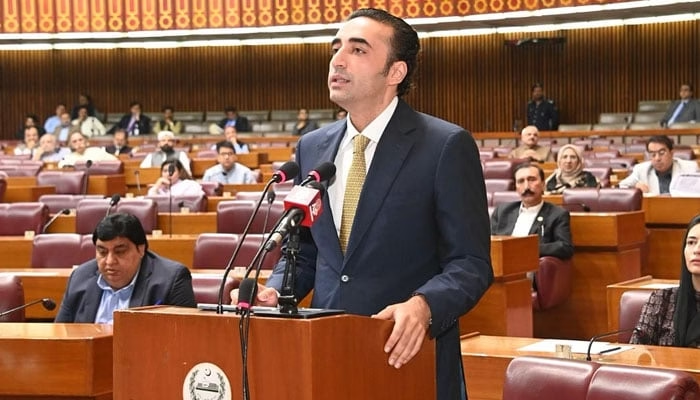Pakistan People’s Party (PPP) Chairman and former Foreign Minister Bilawal Bhutto Zardari has launched a strong diplomatic offensive against India during his ongoing visit to the United Nations headquarters in New York. Leading a high-profile, nine-member Pakistani political and diplomatic delegation, Bilawal addressed key issues of regional peace, Kashmir, terrorism, and India’s alleged weaponization of water resources.
A Strong Message to the World
In a powerful message delivered before his meetings with permanent delegates of several countries at the UN, Bilawal Bhutto made it clear that Pakistan wants peace—but peace founded on equality, justice, and mutual respect.
Pakistan desires peaceful coexistence with all its neighbors,said Bilawal. But sustainable peace in South Asia will remain elusive unless the Kashmir dispute is resolved in accordance with international law and the aspirations of the Kashmiri people.
He accused India of politicizing terrorism, using it as a tool to malign Pakistan both regionally and globally, particularly in the aftermath of the Pahalgam incident in Indian-occupied Jammu and Kashmir. India blamed Pakistan without any evidence,he said. We are here to expose this dangerous and baseless narrative.
Indus Waters Treaty Under Threat
One of the most alarming points raised by Bilawal was India’s alleged actions against the Indus Waters Treaty, a longstanding water-sharing agreement between the two nations. He accused India of opening a new front by weaponizing water—a move he called both illegal and unethical.
India’s unilateral suspension and violations of the Indus Waters Treaty are unacceptable, he emphasized. “Pakistan will protect the Indus River at all costs. Water is not a weapon. It’s a lifeline.
Bilawal warned that India’s aggressive behavior towards Pakistan’s water rights could ignite further tensions and undermine regional peace.
India’s Atrocities in Kashmir and at Home
Bilawal Bhutto also turned the international spotlight on India’s internal human rights violations, particularly under the Modi government. He highlighted the ongoing atrocities against Muslims in India, and the denial of self-determination to Kashmiris living under occupation.
He criticized India for using terrorism as a justification to suppress dissent in Jammu and Kashmir, and for exporting its political narrative into neighboring countries by labeling others as sponsors of terrorism without proof.
If India is committing acts of repression and using terrorism as a political weapon—both against its own people and its neighbors—then the international community cannot stay silent,he said.
Pakistan’s Role as a Victim and Opponent of Terrorism
Reiterating Pakistan’s unwavering stance against terrorism, Bilawal reminded the world that Pakistan has suffered the most in the global war on terror. Tens of thousands of Pakistani civilians and soldiers have lost their lives to acts of terrorism over the past two decades.
Our people reject terrorism in all its forms. We have fought against it and we continue to do so,he said. But when another country uses terrorism as a political weapon against us, it undermines our fight and destabilizes the region.
Diplomatic Engagement at the UN
Bilawal Bhutto is leading a diverse and experienced Pakistani delegation that includes key political and policy figures:
- Dr. Musadik Malik, Federal Minister for Climate Change
- Sherry Rehman, Chairperson of the Senate Standing Committee on Climate Change and former Information Minister
- Hina Rabbani Khar, Chairperson of the National Assembly’s Foreign Affairs Committee and former Foreign Minister
- Engineer Khurram Dastgir Khan, former Minister of Commerce and Defense
- Senator Faisal Ali Sabzwari
- Several other senior senators and diplomats
The delegation is holding strategic meetings with permanent representatives from China, Russia, and OIC member states, aiming to build consensus and raise awareness on the Kashmir issue, water rights, and India’s growing aggression.
A Peaceful Vision—With Conditions
Bilawal Bhutto concluded with a firm yet hopeful message: Pakistan is at the UN not to seek confrontation, but to advocate for peace with dignity.
We have come with a message of peace,he said. But peace must come with justice, equality, and respect for international law.
His remarks underscore Pakistan’s position that genuine peace in South Asia is possible—but only if key issues such as Kashmir and water rights are addressed through diplomacy and dialogue, not coercion or unilateral action.



